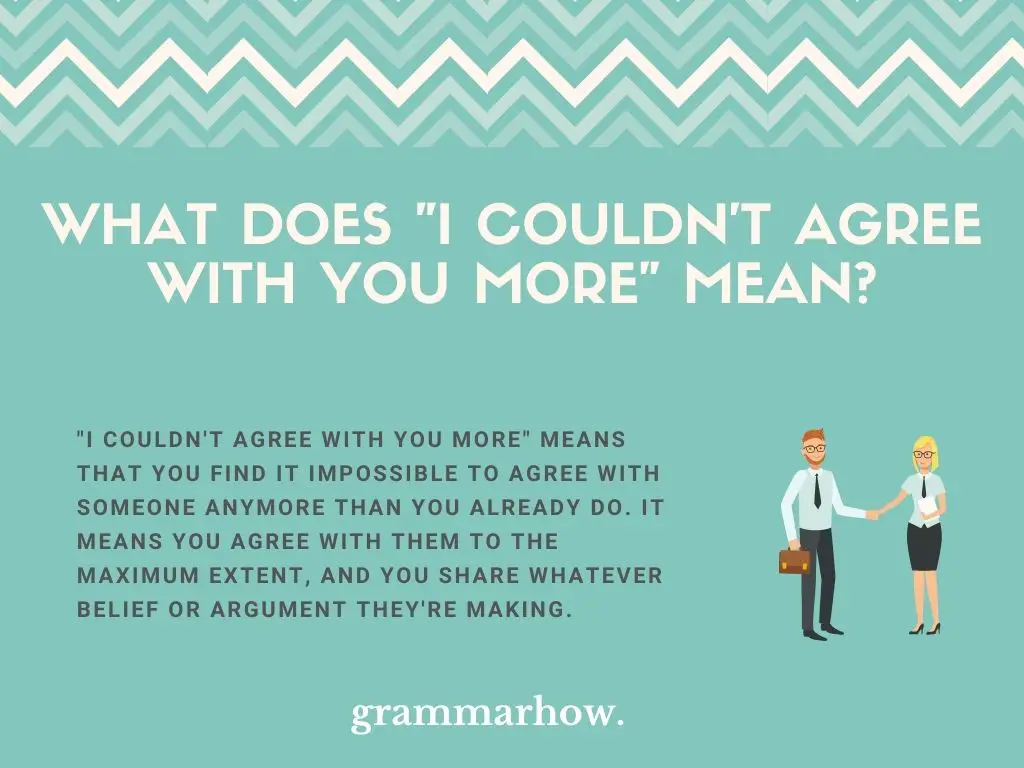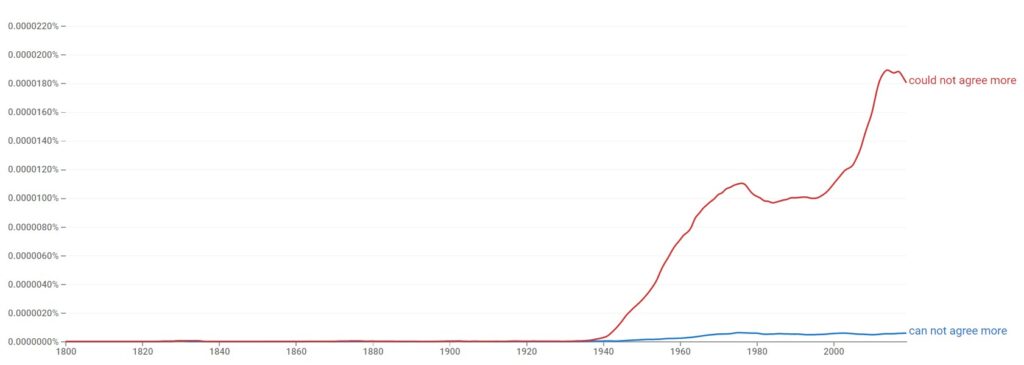Sometimes, you might come across a saying like “I couldn’t agree with you more,” and you might be wondering what it means. In this article, we’ll look at what it means, as well as the grammar rules that go along with it.
What Does “I Couldn’t Agree With You More” Mean?
“I couldn’t agree with you more” means that you find it impossible to agree with someone anymore than you already do. It means you agree with them to the maximum extent, and you share whatever belief or argument they’re making.

According to The Cambridge Dictionary, “agree” means “to have the same opinion.” We use it when we want to share that we hold the same opinion as someone else. So, when we use it in this saying, it means we can’t agree with them more because we’ve already agreed completely.
Is It “Can’t Agree More” Or “Couldn’t Agree More”?
Whether you want to use the contraction “can’t” or “couldn’t” is mostly up to you. It comes down to personal choice.
According to this graph, most people prefer “couldn’t agree more” of the two. “Can’t agree more” is sometimes used, but people often prefer the way the word “couldn’t” sounds in this situation.

If we removed the contraction and looked at the sentences they might create, we’d see the following:
- I can not agree with you more!
- I could not agree with you more!
“Could” is seen as the correct verb tense when we’re writing the phrase in this way (example 2). “Can” is not the correct tense because it’s in the present tense, but we need the past tense “could” because the agreement is already made.
Also, both “can” and “could” are synonymous; however, “could” is much softer in tone and refers to the possibility of something, while “can” often means you have permission to do something. With these meanings, “could” is the best choice.
How Would You Use “Couldn’t Agree More” In A Sentence?
Let’s look at the more popular of the two variations in action to see how we might be able to use it. It’s good to see it in this way because it encourages us to learn how to use it and adapt it for our own writing or conversations.
- I’ve heard what you said, and I couldn’t agree more!
- Honestly, you couldn’t agree more with me if you tried!
- We couldn’t agree more, and we’re ready to see what you’ve got to offer!
- They couldn’t agree more and practically begged me to sign!
- He couldn’t agree more with everything I told him.
- The school couldn’t agree more with the parents of the child.
From these examples, you can see that “couldn’t agree more” feels more natural compared to “can’t agree more.”
It can also apply to a lot of situations, so we included as many pronouns as possible to mix it up. As long as some form of agreement was made and at least two people shared the same opinion, “couldn’t agree more” is a good choice of words to use.
How Would You Use “Can’t Agree More” In A Sentence?
We’ll also show you the less popular “can’t agree more” and how you can use it. The two phrases are synonymous, so you could replace “couldn’t agree more” with “can’t agree more” in the sentences above, but we’ll give you some other ones to try as well.
- I can’t agree more if I tried!
- He told me he can’t agree more!
- They said they can’t agree more.
- We can’t agree more.
- The school board can’t agree more.
- We simply can’t agree more!
Other Ways To Say “I Can’t Agree With You More”
Let’s finish with a few other ways you might be able to say “I can’t agree with you more” to see what other options are available!
- I 100% agree with you.
This is a great informal phrase you can use. “100%” shows that you’re in complete agreement with someone and hold their opinion in high regard.
- I feel exactly the same way you do
This is a more formal saying but works really well as a replacement for the phrase.
- I completely agree with you.
We can also use “completely” in place of “100%” if you want to. It’s slightly more formal, so it can work in more situations.

Martin holds a Master’s degree in Finance and International Business. He has six years of experience in professional communication with clients, executives, and colleagues. Furthermore, he has teaching experience from Aarhus University. Martin has been featured as an expert in communication and teaching on Forbes and Shopify. Read more about Martin here.
